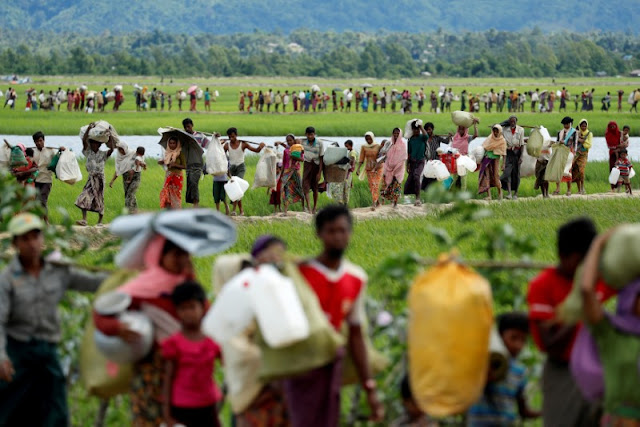HUMAN RIGHTS WATCH (HRW) : ROHINGYA RETURN DEAL BAD FOR REFUGEES
Human Rights Watch has disapproved of the Rohingya
repatriation deal inked between Bangladesh and Myanmar, and said it will “be
bad” for the refugees.
“This agreement looks more like a public relations effort by Burma to quickly close this ugly chapter than a serious effort to restore the rights of Rohingya and allow them to voluntarily return in safety and dignity,”
An agreement by Bangladesh and Burma to begin returning
Rohingya refugees to Burma by January 23, 2018, creates an impossible timetable
for safe and voluntary returns and should be shelved, Human Rights Watch today
said in a letter to the two governments. International donors, who would be
needed to fund the massive repatriation effort, should insist that Burma and
Bangladesh invite the United Nations High Commissioner for Refugees (UNHCR) to
join in drafting a new tripartite agreement that ensures adherence to
international standards.
Since late August 2017, more than 645,000 ethnic Rohingya
have fled a campaign of ethnic cleansing by Burma’s security forces and sought
asylum in Bangladesh. Human Rights Watch has interviewed more than 200 of the
refugees. Many said that they wish to eventually return home, but that they do
not believe it is safe to return to Burma for the foreseeable future and until
their security, land, and livelihoods can be ensured.
“Burma has yet to end its military abuses against the
Rohingya, let alone create conditions that would allow them to return home
safely,” said Bill Frelick, refugee rights director at Human Rights Watch.
“This agreement looks more like a public relations effort by Burma to quickly
close this ugly chapter than a serious effort to restore the rights of Rohingya
and allow them to voluntarily return in safety and dignity.”
On November 23, Bangladesh and Burma signed an “Arrangement
on Return of Displaced Persons from Rakhine State” on behalf of “residents of
Rakhine State” who crossed from Burma into Bangladesh after October 9, 2016 and
August 25, 2017. The agreement makes no reference to the cause of most of the
forced displacement: a campaign of killings, widespread rape, and mass arson
carried out by Burmese security forces that amounted to crimes against
humanity. The agreement also fails to identify the displaced either as Rohingya
or as refugees.
Voluntary repatriation in safety and dignity as required by
international law will not be feasible until the Burmese government demonstrates
its willingness and ability to ensure full respect for returnees’ human rights,
equal access to nationality, and security, Human Rights Watch said.
The agreement expresses Burma’s commitment to “take necessary
measures to halt the outflow of Myanmar residents to Bangladesh” – which raises
grave concerns since everyone has a right to flee persecution in their own
country. The agreement also makes no direct reference to nonrefoulement, the
principle of international refugee law that prohibits the forcible return of
refugees to places where their lives or freedom would be threatened. And the
agreement restricts returnees’ freedom of movement to Rakhine State in
“conformity with existing laws and regulations,” many of which discriminate
against the Rohingya.
Several Burmese officials have spoken about putting Rohingya
in “camps.” This would be an unacceptable approach to their return as camps set
up after previous anti-Rohingya violence have led to de facto detention and
segregation.
While the agreement says that Bangladesh will immediately
seek assistance from UNHCR to carry out safe and voluntary returns, Burma
agrees only “that the services of the UNHCR could be drawn upon as needed and
at the appropriate time.”
“After the widespread atrocities, safe and voluntary return
of Rohingya will require international monitors on the ground in Burma,”
Frelick said. “This means a central role for the UNHCR, the only UN agency with
a statutory mandate to facilitate the voluntary repatriation of refugees.”
Given the critical flaws in the agreement, Burma and
Bangladesh should invite UNHCR to join in the drafting of a new tripartite
agreement, Human Rights Watch said. This should include some existing
provisions, such as encouraging refugees “to return voluntarily and safely to
their own households and original places of residence or to a safe and secure
place nearest to it or their choice.” The current agreement also commits Burma
“to see that the returnees will not be settled in temporary places for a long time.”
















No comments